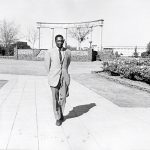Edwin Cameron’s fight for humane prisons
The retired Constitutional Court judge is the new inspector of prisons and he argues that South Africa’s courts should stop filling them up
Author:
28 November 2019

Justice Edwin Cameron is going to jail. The recently retired Constitutional Court judge is the new inspecting judge of the Judicial Inspectorate for Correctional Services – which is the Chapter 9 institution tasked with protecting prisoners’ rights.
Cameron will start his three-year term as prisons inspector in January – and he is undaunted by the prospect of investigating South Africa’s jail nightmare. When I spoke to him last month, he already sensed that the appointment by President Cyril Ramaphosa was in the offing – not least because Chief Justice Mogoeng Mogoeng had recommended him for the job. “I don’t have any grandiose plans or ambitions,” Cameron said. “You have to start with one issue at a time, and do what you can. Start very modestly. Go in and listen.”
But Cameron has always been an activist judge; his approach has been to marry intellectual rigour with the imperative to realise the transformative power of the law.
Related article:
And he is both morally and intellectually opposed to the atavistically punitive impulse that plagues South Africa’s criminal justice policy. That impulse has created a catalogue of harsh minimum sentences, imposed on judges by the law, which have served to fill South Africa’s prisons to bursting point. Counterintuitively, filling up prisons does not reduce crime – in the view of Cameron and just about any crime-policy researcher you care to ask.
The current minimum sentencing guidelines for serious crimes were introduced in 1998, in response to a post-democracy spike in crime, and they were intended as a stop-gap measure – an effort to restore public faith in the state’s capacity to restore law and order. But they did nothing of the sort, and they are still with us, with disastrous effects. South Africa’s prisons are places of misery, violence and disease. Barely anybody comes out of them better equipped to live a constructive life than they were when they came in.
Crime and punishment
“I think vengeance is a respectable reason for wanting to punish,” said Cameron. “But then you’ve got to do it effectively. If you exact vengeance randomly, excessively and irrationally on a small cadre – maybe 500 rapists a year are sentenced to life imprisonment, whereas there are 50 000 rapes – it doesn’t have any beneficial effect. Whereas if you have vengeance that is better directed – through a consistent follow-up, prosecution and arraignment, conviction and sentencing, even if the sentences are much, much lower – then it is well-directed vengeance. And then you can combine it with the other objectives of punishment, which are not just retribution – rehabilitation, reform, training.”
Cameron has a formative memory of the shock of state vengeance. In the first chapter of his memoir Justice: A Personal Account, he describes how his father, an alcoholic, was convicted of car theft when Cameron was eight years old and sent to Zonderwater prison. During the same summer of 1962, Cameron’s older sister, Laura, was knocked over by a delivery van in Pretoria and killed; his father attended the funeral accompanied by two prison guards. “That first encounter with the law, as it held my father captive to exact accountability for a wrong he had committed against society, left in me a deep layering of thought and emotion. What was the law? In what lay its power? Was it only an instrument of rebuke and correction and subjection? Or could it be more?”
Amid a climate of deep anxiety about violent crime, Cameron made a brave and compelling argument against minimum sentencing when he delivered this year’s Rabinowitz lecture at the University of Cape Town. The severity of punishment, he said, has been exhaustively proven to be a much weaker deterrent than high likelihoods of getting caught for a crime and of getting punished for it. “The real and only solution to the crime rate is to recognise that the sole inhibiting institutional response to criminal conduct is the certainty of detection, the certainty of follow-up, the certainty of arraignment, the certainty of prosecution – and the certainty of punishment,” said Cameron.
Creating that certainty in all those steps – or even creating just an acceptable probability of success – seems beyond the powers of what is now a deeply dysfunctional policing and prosecutorial machine.
But Cameron refuses to accept that the job cannot be done. “What we should be doing requires a long, slow process of improving police capacity, not necessarily the numbers; we have enough police people, and 450 000 private security officers. We must improve competence, responsiveness and skill,” he said. “We must restore crime intelligence, unmask criminal syndicates and improve the turnover in the National Prosecuting Authority (NPA). We need, at a neighbourhood level, police responsiveness and competence.”
Ending minimum sentencing
In his lecture, Cameron called for the abolition of all minimum sentences for non-violent crimes such as fraud, extortion and drug offences. He also recommended a programme of releases of offenders who are older than 50 (the age after which the risk of recidivism starts to fall sharply), on a case by case basis.
Cameron also called for the revision of bail conditions – which currently overload awaiting-trial sections of prisons – and for the establishment of a sentencing council that will articulate clear sentencing principles “on a flexible basis, not to tie us up in rigid knots”.
South Africa’s draconian sentencing policies echo those in the United States, the planet’s jailer-in-chief. Decades of heavy sentencing for non-violent crimes (especially drug-related crimes) have given the US the world’s biggest prison population: 2.1 million Americans are behind bars at present.
The rate of incarceration in South Africa – at 334 prisoners per 100 000 people – is about half the US rate of 737 per 100 000. But the South African figure is extremely high nonetheless: it’s the fourth highest in the world, behind the US, Russia and the Ukraine, according to the International Centre for Prison Studies.
Related article:
And even in Donald Trump’s America, there is now a strong momentum towards cutting minimum sentences. The US prison population has fallen in the last decade from a high of 2.3 million in 2008: this despite an increasingly polarised and populist political atmosphere, low crime rates and relatively lavish state budgets for prisons.
Until recently, public and political support for America’s mass incarceration policies was underpinned by a sustained, 30-year decline in crime rates. The jails seemed to be working, in other words – but the authorities now accept that it was correlation, not causation. This month, the state of Oklahoma – which has the highest incarceration rate of all 50 states – released more than 460 prisoners in the largest single-day mass commutation in US history.
“They are ditching minimum sentences in the US and that debate hasn’t reached us yet,” Cameron told me. “The debate started under Barack Obama, but even Trump has signed the Fair Chance bill. The Left and Right, for overlapping and sometimes for inconsistent reasons, are both saying that mass incarceration doesn’t work, it’s too costly, and it’s counterproductive. And we need to get that same debate going here – that was the objective of the Rabinowitz lecture.”
University for crime
In South Africa, the brutality of prison life is arguably unusually toxic to the society as a whole, because it filters out via the bonds between the number gangs inside the jails and organised crime on the streets. Johnny Steinberg’s The Number (2004), a remarkable biography of a Pollsmoor prison gangster, Magadien Wentzel, demonstrated how the Number gangs provide a powerfully affirming communal identity to prisoners – but all too often at the cost of any prospect of a hopeful civilian life after release. In South Africa, jail really is a university of crime: it is not a cliché.
Cameron told me: “There is definitely a direct inside-outside link [between prison gangs and street gangs]. I do think the gang system is embedded in South African street culture and in prison culture and it antedates even the Union of South Africa. Charles van Onselen’s book (The Small Matter of A Horse: The Life of ‘Nongoloza’ Mathebula) shows it goes back to the turn of the 20th century and maybe even earlier. So it’s not something you can simply legislate out, or police out.”
He noted that a subtle and old balance of power and mutual dependency existed between prison warders and prison gangs. “To maintain order in an all-male, coercive environment, you need systems of permissions and tolerance on both sides. And sometimes the gang system offers that. I’m not condoning it.”
Effective justice
Cameron believes that South African courts should explore the potential of restorative justice. “I met the chief justice of the Australian Capital Territories, Chief Justice Helen Murrell, and they have forms of transformational justice in which they set up meetings between the offender and the victim,” he said.
“It doesn’t always work. If you have the Rolex gang beating up your children and threatening your spouse with rape, it might be completely inappropriate. But in appropriate settings you can divert more crimes from the confrontational, punitive aspect. I don’t think it’s pie in the sky. Our objective in the criminal justice system is to be effective. We’re not being effective. We need to think in other ways.”
He is also convinced that needless postponements of trials are hobbling the criminal justice system. “Our criminal justice system is creaking – and one of the biggest problems is sequential postponements, which can be remedied through a change of judicial attitude and a change of professional rules.
“Often sequential postponements are secured through collusive stunt agreements between a crooked lawyer, or an on-the-margin lawyer, and the accused. So the lawyer says, sack me and you’ll get a postponement. I know this happens. Or else the accused simply wants to defer the trial, and sacks the lawyer. In America, once you have taken instructions from a criminal accused and appeared before the court, you are shackled to that accused.”
Cameron believes the same principle should apply here. “Once you have accepted a brief, you should only be excused in the rarest of circumstances,” he said. “Once we’ve changed those rules – and it’s within our power to change them – we will have a markedly more efficient criminal justice system. It will cut out all these bogus postponements and shorten criminal trials.”
Related article:
These practical tweaks to the daily workings of justice are not just mere court management questions, says Cameron. They go to the heart of the state’s duty to protect its citizens from violence and injustice – a core duty imposed the Constitution.
Despite having served and protected the Constitution for much of his working life, Cameron is not reflexively defensive about its sacredness. The text is only as powerful and redemptive as we make it, he suggests. “The people who are aggrieved and angry and dissatisfied with the Constitution have got a good point. You and me sitting here in these lovely surroundings on Wits campus, drinking cappuccinos, eating tramezzini, who have been best served by it. Those who have not been best served are right to demand better.”
And few South Africans have been less served by the Constitution than prisoners.



